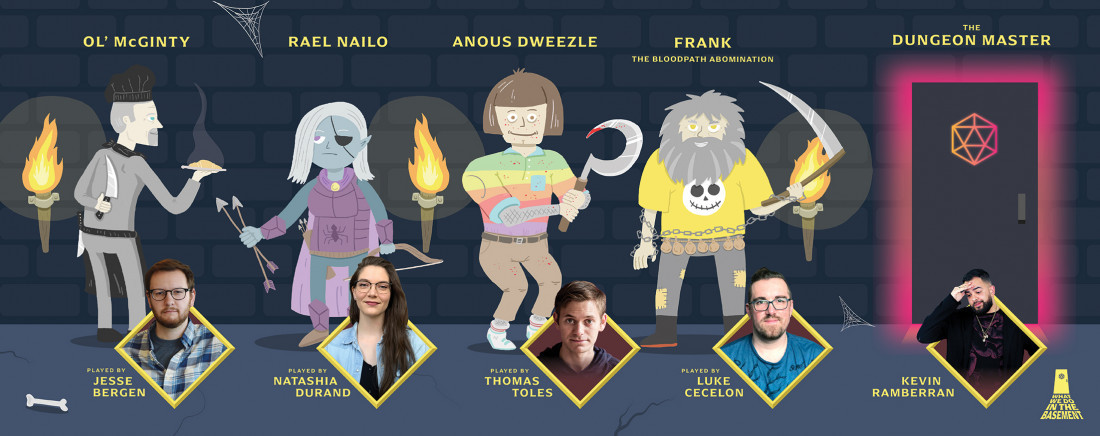Don’t have to social distance while fighting a dragon
D&D uses ‘theatre of the mind’ to bring fantasy worlds to life

The podcast What We Do in the Basement is one example of how Dungeons & Dragons players and fans have connected online. (Jesse Bergen/Supplied)
The role-playing game Dungeons & Dragons (D&D) had its biggest year ever during the COVID-19 pandemic. Sales grew 33 per cent in 2020, due to adventures like battling goblins and traversing orc villages living in the collective imaginations of the players. This means these supernatural spaces can live anywhere, including online.
Miranda Moroz is an avid D&D player and Dungeon Master (DM) for several campaigns, meaning she leads the players through the world of the game.
For Moroz, “music and ambient sound is a really big component to D&D.” It helps players think about the space they’re in and sets the mood of the scene,” she says. Moroz also makes maps using cartography software to display the worlds of D&D games.
“Putting together the geography of your space can help you to describe things more vividly,” she says, noting that having a sense of geography can inform the specifics of gameplay.
The transition to playing D&D online for COVID was easy for Moroz, because she started DMing online before serving as a DM in person. “The methods of creating that immersive environment is relatively similar, whether you are in person or online. The resources to do so are just different,” she says.
Back in 2020, Kevin Ramberran started recording a podcast project called What We Do in the Basement in person before moving online for COVID. Ramberran DMs and produces the “comedy D&D podcast, where improvisers explore fantasy worlds, battle foes and navigate political conflicts with the help of their wits, weapons and obscure pop-culture references.”
Inspired by other D&D podcasts, Ramberran created a campaign from scratch to allow the improvisers Natashia Durand, Thomas Toles, Jesse Bergen and Luke Cecelon room to play and leave their mark on the game’s world. This adaptability is in “the spirit of the podcast, (which) is comedy and improv,” Ramberran says.
“I’m very open to the fact that the players ... may create both backstory but also literal physical things that are in the space that I didn’t anticipate,” he says. “It’s really important to keep the theater of the mind in mind when we’re (recording). We should be able to play this podcast with our eyes closed.”
The improvisers from the podcast, including members of local comedy group Club Soda, went from live comedy to online shows for COVID. But without the audience feedback, it’s not the same, Ramberran says.
“Right now, a lot of (musicians) are trying to find ways to write, record and release (music), and this (podcast) is sort of like the comedy equivalent,” he says.
There’s been “a huge rise (in D&D) during the pandemic because of its flexibility and, its ability for people to play remotely, and, as a performer, to put a comedic spin on that has given us ... access (to) an audience we otherwise wouldn’t have,” he says.
There’s a perceived “gateway to entry,” but even with the complex rule systems of D&D, anyone can curate how the game works, Moroz says. “The beauty of D&D, and notably of tabletop role-play games, is no one’s judging how closely you’re following the rules.”
Find What We Do in the Basement @wwditb on social media or search for them wherever podcasts are found. Check out Moroz’s cartography @pandorasmaps on Instagram.
Published in Volume 75, Number 24 of The Uniter (May 1, 2021)






